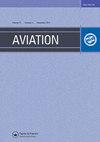VIBROACOUSTIC SOUNDPROOFING FOR HELICOPTER INTERIOR
IF 1.3
Q3 ENGINEERING, AEROSPACE
引用次数: 0
Abstract
As VIP passengers generally want to fly civil and executive jets where vibratory and acoustic environment is smoother than on the normal jets. Helicopter interior noise is generated by main and tail rotors, engines, main gearbox, and aerodynamic turbulence (Lu et al., 2018). Because of these sources, the tonal and broadband noise is incredibly high and needs to be reduced. Conventional passive system (soundproofing) is the best way to control the acoustic of the cabin whereas active systems (active vibration and noise control) are not completely reliable or applicable. The design of the soundproofing may be researched by simulation using one of these programs: ANSYS, SOLIDWORKS 2020 and ACOUSTIC analysis Vibroacoustic Monitoring (VAM) approach. The analyses were performed from frequency ranges, 5-10Hz and 0-2000Hz then transformed into frequency velocity domain using Proudman’s equations (Lu et al., 2017). Soundproofed ANSYS models are validated using instantaneous sound pressure levels measured within the helicopter during flight. The acoustic detection method for GAZELLE is also performed successfully in SOLIDWORKS for aluminum alloy and titanium alloy, this proves the relationship between acoustic power levels and material configuration. The noise coefficient responses of interior materials are used as main index for soundproofing helicopter interiors. The results of this research can be used for implementation of VAM approach for soundproofing helicopter interiors.直升机内部的振声隔音
由于贵宾乘客通常希望乘坐振动和声学环境比普通飞机更平稳的民用和行政飞机。直升机内部噪声由主旋翼和尾桨、发动机、主变速箱和空气动力学湍流产生(Lu et al.,2018)。由于这些源,音调和宽带噪声非常高,需要降低。传统的被动系统(隔音)是控制机舱声学的最佳方式,而主动系统(主动振动和噪音控制)并不完全可靠或适用。隔音设计可以使用以下程序之一进行模拟研究:ANSYS、SOLIDWORKS 2020和声学分析-振动声学监测(VAM)方法。从5-10Hz和0-2000Hz的频率范围进行分析,然后使用Proudman方程将其转换为频率-速度域(Lu等人,2017)。使用飞行过程中直升机内测量的瞬时声压级验证了隔音ANSYS模型。GAZELLE的声学检测方法也在SOLIDWORKS中成功地用于铝合金和钛合金,这证明了声功率水平与材料配置之间的关系。直升机内部材料的噪声系数响应是直升机内部隔音的主要指标。该研究结果可用于直升机内部隔音VAM方法的实施。
本文章由计算机程序翻译,如有差异,请以英文原文为准。
求助全文
约1分钟内获得全文
求助全文
来源期刊

Aviation
ENGINEERING, AEROSPACE-
CiteScore
2.40
自引率
10.00%
发文量
20
审稿时长
15 weeks
期刊介绍:
CONCERNING THE FOLLOWING FIELDS OF RESEARCH: ▪ Flight Physics ▪ Air Traffic Management ▪ Aerostructures ▪ Airports ▪ Propulsion ▪ Human Factors ▪ Aircraft Avionics, Systems and Equipment ▪ Air Transport Technologies and Development ▪ Flight Mechanics ▪ History of Aviation ▪ Integrated Design and Validation (method and tools) Besides, it publishes: short reports and notes, reviews, reports about conferences and workshops
 求助内容:
求助内容: 应助结果提醒方式:
应助结果提醒方式:


